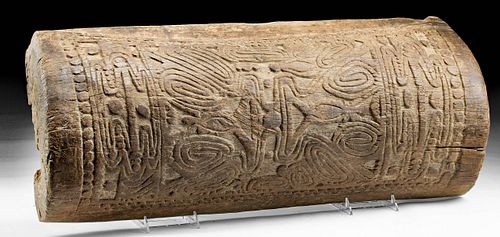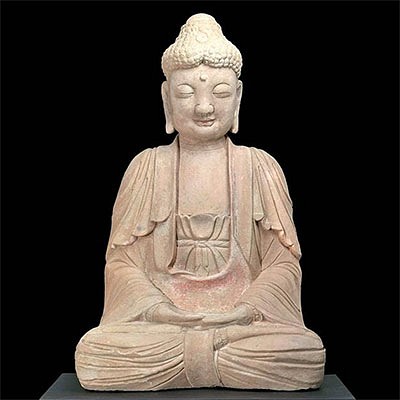18th C. Papua New Guinea Wood Drum Segment - C14 Tested
Lot 146
About Seller
Artemis Gallery
686 S Taylor Ave, Ste 106
Louisville, CO 80027
United States
Selling antiquities, ancient and ethnographic art online since 1993, Artemis Gallery specializes in Classical Antiquities (Egyptian, Greek, Roman, Near Eastern), Asian, Pre-Columbian, African / Tribal / Oceanographic art. Our extensive inventory includes pottery, stone, metal, wood, glass and textil...Read more
Categories
Estimate:
$19,000 - $28,500
Absentee vs Live bid
Two ways to bid:
- Leave a max absentee bid and the platform will bid on your behalf up to your maximum bid during the live auction.
- Bid live during the auction and your bids will be submitted real-time to the auctioneer.
Bid Increments
| Price | Bid Increment |
|---|---|
| $0 | $25 |
| $300 | $50 |
| $1,000 | $100 |
| $2,000 | $250 |
| $5,000 | $500 |
| $10,000 | $1,000 |
| $20,000 | $2,500 |
| $50,000 | $5,000 |
| $100,000 | $10,000 |
| $200,000 | $20,000 |
About Auction
By Artemis Gallery
Feb 18, 2021
Set Reminder
2021-02-18 10:00:00
2021-02-18 10:00:00
America/New_York
Bidsquare
Bidsquare : Exceptional Antiquities, Asian, Ethnographic
https://www.bidsquare.com/auctions/artemis-gallery/exceptional-antiquities-asian-ethnographic-6373
Museum-worthy examples of Egyptian, Greek, Roman, Etruscan, Near Eastern, Far East / Asian, Pre-Columbian, African / Tribal, Oceanic, Native American, Spanish Colonial, Russian, Fossils, Ancient Jewelry, Fine Art, so much more! Artemis Gallery info@artemisgallery.com
Museum-worthy examples of Egyptian, Greek, Roman, Etruscan, Near Eastern, Far East / Asian, Pre-Columbian, African / Tribal, Oceanic, Native American, Spanish Colonial, Russian, Fossils, Ancient Jewelry, Fine Art, so much more! Artemis Gallery info@artemisgallery.com
- Lot Description
Oceania, Papua New Guinea, East Sepik region, ca. 18th to 19th century CE. A massive hand-carved wooden section of a drum with intricate carvings. The drum is shaped from a singular piece of wood from a felled tree and is extensively embellished with relief carvings across the face. If you are familiar with Sepik culture, you may notice the carvings look like the anthropomorphic yam masks with lizard-like forms in the center. The abstract faces may also represent ancestor spirits. These carvings are framed by a border of waving lines and circles. This is half of a slit drum, a form known as a garamut, the most important instrument in the Sepik River area. Such drums are used in ceremonies, to issue warnings, and to call people to meetings. Size: 14" L x 5.5" W x 34" H (35.6 cm x 14 cm x 86.4 cm)
See a Garumut drum at the Minneapolis Institute of Art (object number 93.12). The curatorial description includes this wonderful contextual passage about the ancestral figures depicted on the drum as well as the sound made by the drum capturing its voice: "These figures represent important ancestors and demonstrate clan affiliation. The people of the Sepik area understand the drum's sound as its 'voice.' This voice can carry long distances to announce meetings, call individuals, issue warnings, and even contact neighboring villages. Communication occurs through a complex series of rhythms and tones beat out with a wooden stick by an initiated man. More than just an instrument, this drum is central to the lives the entire community."
Provenance: private Hawaii, USA collection; ex-Dr. Gallagher collection, Sydney Australia 1960 to 2000
All items legal to buy/sell under U.S. Statute covering cultural patrimony Code 2600, CHAPTER 14, and are guaranteed to be as described or your money back.
A Certificate of Authenticity will accompany all winning bids.
We ship worldwide and handle all shipping in-house for your convenience.
#161523Section of a drum as shown. Losses to peripheries. Stable fissures and abrasions. Old insect bore holes. Nice patina! Modern wire nailed to back for suspension.Condition
- Shipping Info
-
All shipping is handled in-house for your convenience. Your invoice from Artemis Gallery will include shipping calculation instructions. If in doubt, please inquire BEFORE bidding for estimated shipping costs for individual items.
-
- Buyer's Premium



 EUR
EUR CAD
CAD AUD
AUD GBP
GBP MXN
MXN HKD
HKD CNY
CNY MYR
MYR SEK
SEK SGD
SGD CHF
CHF THB
THB















